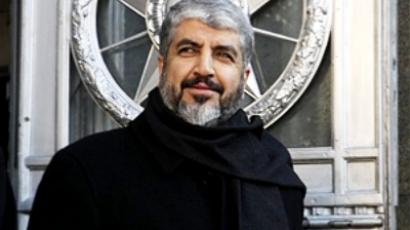Peace talks kick off amid skepticism
It’s another picture perfect moment for US president Barack Obama. The leaders of Israel, the Palestinian Authority, Jordan and Egypt have been summoned to Washington, DC for the latest round of peace talks.
However Yousef Munayyer, the executive director of the Palestine Center is not optimistic the talks will produce results.
"There are a number of reasons why we can be skeptical of talks and to think that the Obama administration is only doing this for the photo op," said Munayyer.
With negotiations underway at the White House, it is almost impossible to have peace talks without protest. The highly anticipated summit in Washington is already being labeled a failure, because the conditions in which the Palestinians would meet with the Israelis are still in dispute. One of the main issues is a moratorium on Israeli settlements in occupied Palestinian lands.
Dan Pollack of the Zionist Organization of America disagreed, “What you are calling settlements are neighborhoods, you have to understand the area you are calling Palestinian territory has never been Palestinian territory."
The Gaza strip has been under Israeli siege for the past three years. No Representatives from Gaza, which is currently governed by Hamas, will be at the negotiating table. The US and Israel consider Hamas a terrorist organization, even though Israel and the US pushed for the elections which brought Hamas in power.
"One of the major fault lines is between Hamas and the PLO. As you know there was an election in 2006 and Hamas won an overwhelming majority. Even though the US and Israel supported the election, after Hamas won, the U.S. the PLO and Israel wanted the election to be null and void and tried not to recognize it. Eventually Hamas politicians were arrested," said Rob Mansour, the executive director the US Campaign to End the Israeli Occupation.
RT asked State Department spokesman P.J. Crowley during the daily press briefing, “Where does Gaza fit into these peace talks?"
"Is Gaza and the situation in Gaza, broadly speaking part of this process, yes it is. We are gratified the recent changes in policy have been made," Crowley responded.
"What changes have been made? You say that changes have been made?"
Crowley said, "It's indirect, but I am certain that as we increase the connect between the Palestinians and Israelis, Gaza will be discussed."
“While I think the reason Hamas is not included is because Hamas is still being considered a taboo,” said Munnayyer.
Peace talks are excluding one-and-a-half million Palestinians and the flimsy settlement freeze set to expire by the end of the month
But, how do the American people feel about the latest negotiations?
"The peace process goes against the bible," one man said.
Another woman said, "I'm not optimistic that this meeting is going to solve anything."
"The outcome will be the same as after Olso after other negotiations in the past and that the seizing of Palestinian land will continue, the destruction of Palestinian homes will continue, the death of Palestinian civilians will continue and essentially the process of a very slow ethnic cleansing will continue" said Mansour.
"If the hopes are disappointed again, the price of failure will be too high for all," King Abduallah of Jordan said.
A price the Obama administration is gambling with as clouds of uncertainty fog the future of a Palestinian state.
Richard Hellman of Christians’ Israel Public Action Campaign said Hamas is a declared terrorist organization and has no business in the process.
“Hamas is pretty much a pawn of Iran, which is the real issue that we should be dealing with,” said Hellman.
He argued that their intents are genocidal and will not contribute anything to peace.
Norman Finkelstein, author of "The Holocaust Industry", disagreed, arguing that Hamas was the fairly elected leadership of Gaza and has an interest in the peace process.
“Hamas has repeatedly made statements over the past several years that it’s willing to accept the settlement of the June 1967 border. Under the terms of the international settlement, or proposed international settlement, Hamas has met its responsibilities. It said it will accept a Palestinian state under June 1967 borders,” said Finkelstein.
Finkelstein did acknowledge that Hamas has practiced terrorism, but argued that Israel itself has also practiced terrorism.
Hellman referred to such allegations as “absurd”. Further he argued that the talks were going to fail.
“We’re talking about taking 600,000 Jews, evicting them from their homes, their livelihood, all of their infrastructure and declaring that all of the area where they live today, historic Jerusalem, historic Israel, all the communities that they have legally built since 1967,” said Hellman.
He later added, “It’s just not going to happen.”
Finkelstein said that Israel has an obligation to Palestine, and that Palestine has no reason to concede, arguing they have already conceded their historic homeland to Israel.
“The burden is now on Israel,” he said.
Hellman disagreed, “They [Palestinians] have not met their obligations.”
“Israel has agreed that this creation, this public relations fiction of this Palestinian Arab people who had the claim to some kind of past homeland that is now going to be constituted, that they will talk about creating a Palestinian Arab state. But, today there is no one on the Palestinian Arab side that can give peace or security,” said Hellman.
The Palestinians need to meet the concessions of stopping the violence and ending terrorism, argued Hellman.
“You have no relationship to reality; the Palestinians don’t exist, their a fiction. The occupation doesn’t exist, the occupation is a fiction. Everything is a fiction. You live inside a fictional world,” said Finkelstein.
Both agreed that the peace talks are likely a political photo-op for Obama leading up to the US mid-term elections.














